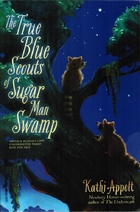The True Blue Scouts of Sugar Man Swamp by Kathi Appelt is one of the books that keeps cropping up in Mock Newbery discussions, so I thought I had better read it.
Bingo
and J'miah are two young raccoons, official True Blue Scouts of the
Sugar Man Swamp. They know their duties: be true and faithful to each
other, heed the Voice of Intelligence, and in case of emergency, wake
the Sugar Man. What Bingo and J'Miah don't know yet is that trouble is
heading for the swamp from two different directions. A whole herd of
destructive feral hogs is about to descend on the peaceful place -- and
there's a human critter stirring up trouble, too. Sonny Boy Beaucoup,
owner of the swamp, is planning to pave over the whole thing for a theme
park and gator wrestling arena. There's another problem, too: Bingo and
J'miah don't exactly know where to find the Sugar Man, a legendary
figure distantly related to Sasquatch. Nor do they know how to wake him
up when they do find him. And Bingo and J'miah are not the only ones
anxious to save the swamp: twelve-year-old Chaparral Brayburn is also
looking for a way to thwart Sonny Boy's schemes. But how can a
twelve-year-old boy, a mythical creature, and two raccoons save the
swamp?
Friends, am I the right reader for this book? I think it's
safe to say that I am not. You see, this story has a definite voice.
It's Southern. It's folksy. It's east Texas to the core, brothers and
sisters, and it drips with sugar-cane sweetness. I can admire how
consistent the voice is, and how well the plot pulls together in the
end, but all the time, the voice is grating on my last nerve. Friends,
have you ever read a book that grates on your last nerve? If so, you'll
know it's a sensation akin to slogging through swamp muck while wearing a
pair of Sonny Boy Beaucoup's patent-leather loafers.
*Ahem*
Sorry, I got carried away for a minute. As I was saying, readers who
enjoy this sort of book, with its folksy voice and tall-tale elements
will love this story. I am not that reader, so I barely tolerated it,
and I found myself irritated by small details, like the fact that the
author spelled the name Aloysius like it sounds (Alouicious), and at an
entire subplot about the Ivory Billed Woodpecker, which fizzled out in
the end and apparently only existed in the book because it's trendy (or
maybe because it gave two separate characters the opportunity to say
"Lord God!" in reference to the bird). And the fact that the animals in
the swamp could apparently hear the rumbling approach of the feral hogs
when they were still three days' walk away. But I'm sure that readers
who are not already irritated with that smug Southern narrative voice
would be a lot more forgiving of this book's other foibles. So, if you
are that reader, go for it. And if you're not . . . well, you've been
warned.
(Reviewed from an advance copy, courtesy of the publisher.)

No comments:
Post a Comment